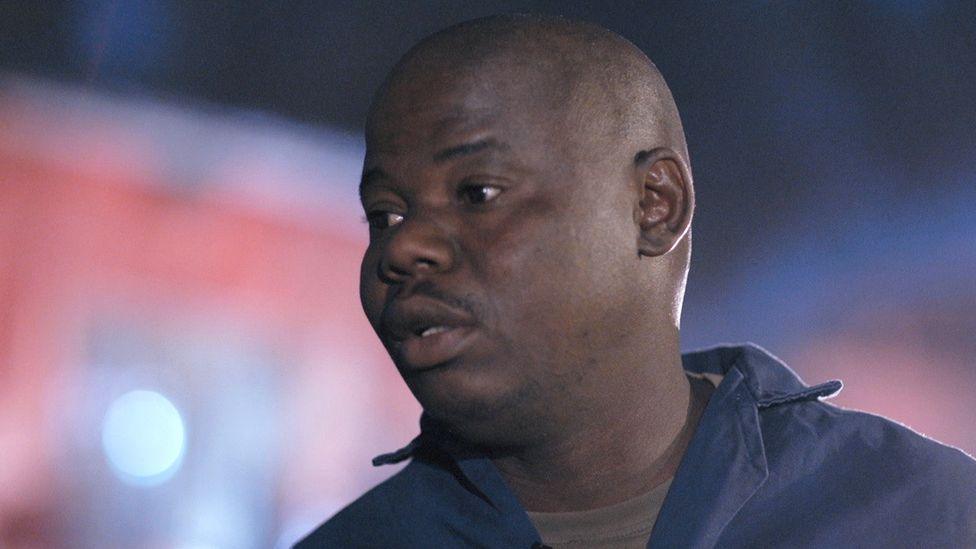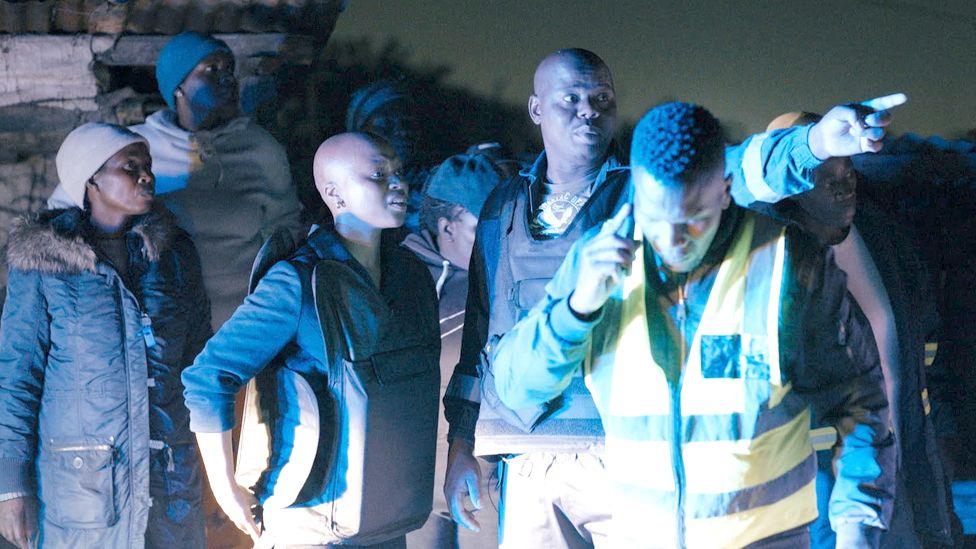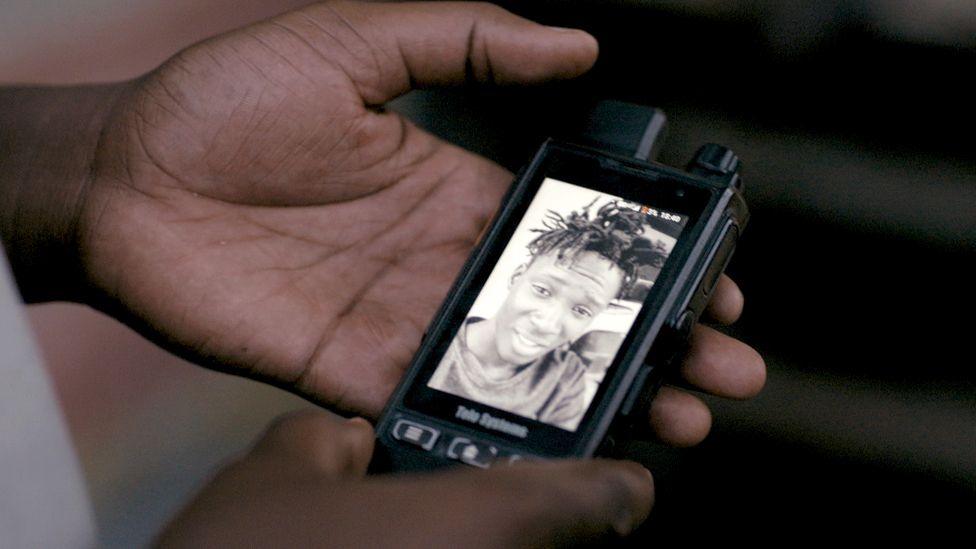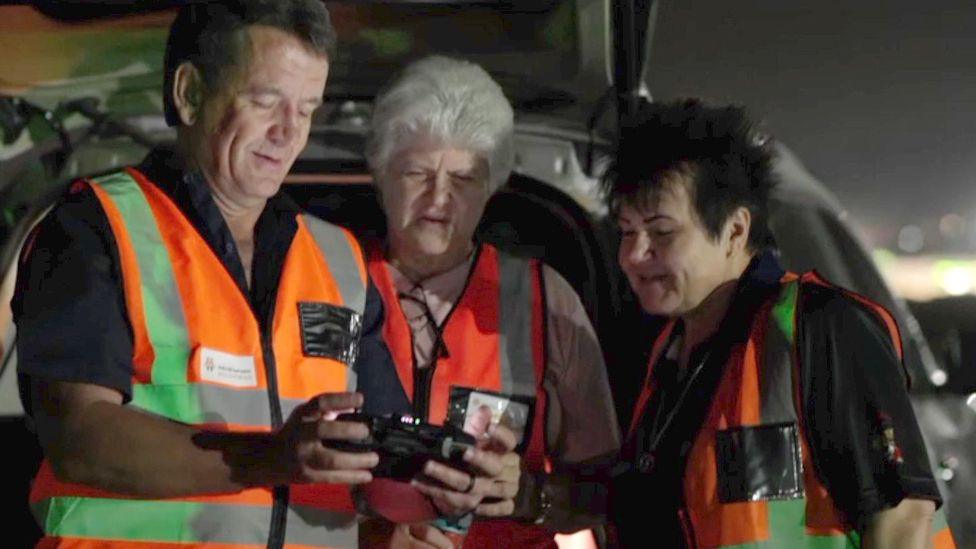The volunteer crime fighters using whistles, whips and guns

Abel Rapelego says his team of volunteers help protect the community
- Published
Concerns about violent crime will be on the minds of South Africans as they go to the polls later this month, with politicians making all sorts of promises about dealing with it. With murder rates at a 20-year high, BBC Africa Eye had exclusive access to the frontline communities who are fighting back.
A shriek of whistles fills the air as people in yellow and orange hi-vis vests start running.
“Oh God,” someone shouts as a policeman lies slumped on the ground. He has been shot.
It is Friday night in Diepsloot, a township on the outskirts of Johannesburg - South Africa’s commercial hub.
“This is a regular occurrence,” says Abel Rapelego. The 41-year-old leads a team of volunteers who patrol the streets each night after dark.
The sirens from a police car disperse the mounting crowds.
“Patrollers, out of the way!” Mr Rapelego shouts to his team. “Let us give the law enforcement their time to do their job.”
The police officer, 38-year-old Tom Mashele, was taken to hospital but died a few weeks later. No-one has been arrested over his killing, which happened when he was off-duty.

The volunteers will stop people and question anyone they think is suspicious
South Africa has one of the highest murder rates in the world, according to the latest figures from the United Nations Office on Drugs and Crime. There were more than 27,000 murders last year; that amounts to 45 people per 100,000. For comparison, the US rate is six per 100,000.
In the face of this, Mr Rapelego says the only way to keep their families safe is for volunteers to patrol the communities themselves, even if it means risking their own lives as “Diepsloot is in the hands of the criminals”.
The team of volunteers works closely with the municipal police.
It is an unofficial arrangement, as some of what they do is not legally sanctioned. No-one is paid and they do not carry guns. But they do have a sjambok, a traditional leather whip.
“We’re doing stop and search and if you are a criminal and you are not going to comply with us, the sjambok will apply also to you,” says Mr Rapelego.
The volunteers do not have the legal authority to carry out stop-and-search operations, nevertheless the team goes street by street questioning anyone who is out late.
As they walk past a shop, the owner says he has just been mugged. The volunteers manage to grab hold of a man seen running away and search him for the missing phones and money.
They whip him with the sjambok, which in itself is seen as a crime. There is no evidence he has done anything wrong, so they let him go.
When challenged on what right they have to do this, Mr Rapelego defends the use of force, saying: “Remember, Diepsloot is our place and if we don’t fix our Diepsloot, no-one will fix this Diepsloot.”
South Africa’s crime statistics show murder victims are overwhelmingly young black men, and the volunteers also place themselves at risk.
Two years ago, 21-year-old Alpha Rikhotso was shot and killed while out on patrol.
“I’m trying to accept the situation but it’s still painful,” says his father, David Rikhotso.
“He was trying to protect his life, my life and everyone. He was fighting against crime.”

David Rikhotso shows a picture of his son, Alpha, who was shot dead two years ago
His son was the first one on the scene when the volunteers blew their whistles to alert the group about criminal activity. He managed to catch the man, but was shot in the arm.
He did not survive the injury. Just like with the policeman, no-one was ever arrested for the killing.
“Every day people are getting robbed. People are dying every day. I pray day and night that they [the patrollers] can be safe. There is no law in this place,” Mr Rikhotso tells BBC Africa Eye.
The damage the level of violent crime causes to the economy is huge.
The World Bank estimates the cost of South Africa’s violent crime is almost $40bn (£32bn) - at least 10% of its GDP every year.
And the problem cuts across racial lines, which remain clearly defined despite the end of the system of legalised racism, known as apartheid, three decades ago.
Sixty kilometres (37 miles) north-west of Diepsloot, another volunteer patrol group sets off in Brits, a town in North West province.
This one is organised by farmers from a group called Afriforum. They say they represent the interests of mainly white Afrikaners and have more than 300,000 members nationwide.
With pick-up trucks, quad bikes and drones they search farms and abandoned buildings through the night. They say they are looking for stolen goods, stashed to be picked up later, or anyone out late who looks suspicious.
Many of them, like volunteer Dewald van Wyngaardt, are armed.
“You can’t go to a gunfight with a knife. I won’t hesitate to protect my family. That’s it. If I must come into a scuffle with another guy and he will hurt me, I won’t stand back for him,” he says.

The Afriforum volunteers are on the look-out for what they suspect might be criminal behaviour
The farmers take it in turns to patrol through the night, sometimes four or five times a week. Johan de Klerk, Afriforum’s neighbourhood and farmwatch leader, has been doing these night watches for the last five years.
“We have to lock up our sheep every night just to make sure you have something to work for tomorrow. It’s going to be difficult to carry on like this, because you work a full day and at night you do patrols.”
Attacks on white farmers have received global attention.
In 2018 President Donald Trump posted a tweet suggesting the South African government was seizing land from white farmers, which was untrue. He also cited the “large-scale killing of farmers”.
In July last year, the Pretoria-born head of Tesla, Elon Musk, added to the narrative in another tweet about the opposition Economic Freedom Fighters party, saying: “They are openly pushing for genocide of white people in South Africa.”
There is no evidence farmers are at any greater risk than anyone else.
Statistics show white South Africans are just over 7% of the population but make up less than 2% of murder victims, however the fear among the farming community is real.
“We are living in cages and that is abnormal. It shouldn’t be like this. If one thing can get changed in this whole country is that crime just has to disappear,” says Mr De Klerk.
The police do accept that “crime is at unacceptable levels in some parts of the country”, but in a statement to the BBC a police ministry spokesperson said that “various and very aggressive policing interventions have been ushered in to improve the crime situation".
"These include the mass recruitment drive of 30,000 police officers over three years." Police budgets have also almost doubled in 20 years.
But when it came to some of the actions of the volunteer groups that BBC Africa Eye spoke to, the spokesperson was clear that “acts outside the law can never be condoned or tolerated and any member of the community who resorts to taking the law into their own hands will continue to face the full might of the law".
However, this may not put them off because as crime rates remain high, some people across South Africa are willing to do whatever they feel it takes to protect their communities.
You can watch the full BBC Africa Eye documentary here., external
More BBC Africa Eye stories:

Go to BBCAfrica.com, external for more news from the African continent.
Follow us on Twitter @BBCAfrica, external, on Facebook at BBC Africa, external or on Instagram at bbcafrica, external